 MyDogBreeds
MyDogBreeds Gaddi Kutta is originated from India but Fox Terrier is originated from United Kingdom. Gaddi Kutta may grow 32 cm / 13 inches higher than Fox Terrier. Gaddi Kutta may weigh 35 kg / 78 pounds more than Fox Terrier. Both Gaddi Kutta and Fox Terrier has same life span. Gaddi Kutta may have more litter size than Fox Terrier. Gaddi Kutta requires High maintenance. But Fox Terrier requires Low maintenance
Gaddi Kutta is originated from India but Fox Terrier is originated from United Kingdom. Gaddi Kutta may grow 32 cm / 13 inches higher than Fox Terrier. Gaddi Kutta may weigh 35 kg / 78 pounds more than Fox Terrier. Both Gaddi Kutta and Fox Terrier has same life span. Gaddi Kutta may have more litter size than Fox Terrier. Gaddi Kutta requires High maintenance. But Fox Terrier requires Low maintenance
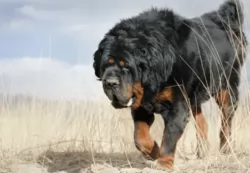 The Gaddi Kutta is mountain dog of the mastiff line from northern India. They are mostly found in the western Himalayas and Himachal Pradesh. It is also seen in Nepal and often named the Indian Panther Hound and the Mahidant Mastiff. They were bred to hunt but because of their strength and intelligence they are used to guard and herd goats and sheep. They are strong enough to defeat or scare off a panther or snow leopard and intelligent enough to work independently in finding strays and bringing them back to their pens. They have been known to protect herds of cattle from bears and leopards.3 or 4 of them working together can handle the guard duties for thousands of cattle.
The Gaddi Kutta is mountain dog of the mastiff line from northern India. They are mostly found in the western Himalayas and Himachal Pradesh. It is also seen in Nepal and often named the Indian Panther Hound and the Mahidant Mastiff. They were bred to hunt but because of their strength and intelligence they are used to guard and herd goats and sheep. They are strong enough to defeat or scare off a panther or snow leopard and intelligent enough to work independently in finding strays and bringing them back to their pens. They have been known to protect herds of cattle from bears and leopards.3 or 4 of them working together can handle the guard duties for thousands of cattle.
Their reputation precedes them – as ferocious and courageous, unmatched in their instincts to protect what is theirs. In the line of the Mastiffs and Molosser, the Gaddi is powerful and agile, and considered to be of ancient heritage though no one is sure what their origin is. The local myth is that dogs were crossed with tigers. It is more likely that dingo-like wild hounds from the Himalaya were crossed with the Tibetan Mastiff to create the Gaddi Kutti. Also found in Pakistan, most lines of the breed have been crossed with others including the German Shepard and the Bully Kutta. Outside of the Himalayas there are not many if any pure lines. The Gaddi Kutta is a good family dog if you socialize him as a puppy. He will be gentle, calm and intuitive with his family, but aggressive toward strangers and other dogs.
 The Wirehaired Fox Terrier and the Smooth Fox Terrier were for over 100 years the same breed of dog. Now it is believed that they are two separate breeds with two separate ancestry. It is an English creation with Dachshunds, Fox Hound, English Hounds, and Beagle in their background. It is also believed that the Wales, Durham and Derbyshire extinct rough-coated black and tan working terrier. The white terrier breeds that exist today are related to the Fox Terrier. In addition, it is recognized that terrier breeds of today such as the Jack Russel, the Rat Terrier, and the Miniature Fox Terrier are descendants of the Fox Terrier.
The Wirehaired Fox Terrier and the Smooth Fox Terrier were for over 100 years the same breed of dog. Now it is believed that they are two separate breeds with two separate ancestry. It is an English creation with Dachshunds, Fox Hound, English Hounds, and Beagle in their background. It is also believed that the Wales, Durham and Derbyshire extinct rough-coated black and tan working terrier. The white terrier breeds that exist today are related to the Fox Terrier. In addition, it is recognized that terrier breeds of today such as the Jack Russel, the Rat Terrier, and the Miniature Fox Terrier are descendants of the Fox Terrier.
They are one of the oldest of the terrier breeds dating back to the 17tth century in the British Isles. They were primarily farm dogs guarding against the fox and vermin. Like any terrier they go to ground – digging, growling, barking and lunging at the den until the animal comes out and the farmer killed it. The breed was made popular in England through their living with royalty. The Nots Kennel had a lot to do with this as well. King Edward VII’ Wire Fox Terrier came from the Notts Kennel. The Best Champion of Crufts in 1911 was a Wire Fox Terrier, and Queen Victoria had one as well. The Wire Fox Terrier finally became a family dog in the 1930’s. During this time there were feature movies and comic strips that feature a Wire Fox Terrier, such as The Thin Man and The Adventures of Tintin.
The late 1900’s saw the population moving off the farms, out of the country and into the cities. This caused a decline in the popularity of the breed. Keeping terriers born to hunt in the city proved a challenge in the beginning. Their popularity is influenced as well by the breeds success in the prestigious Westminster Kennel Club Dog Show in New York – second only to the Crufts Dog Show in England. Adding to their early success at Crufts, the Wirehaired Fox Terrier breed has won more Westminster Best in Show than any other with 14. Only five dogs have won at Westminster more than once and one of those is a Wirehaired Fox Terrier. A Smooth Fox Terrier won it three times.
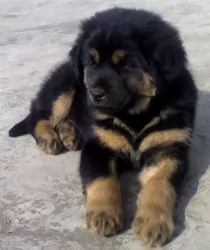 The Gaddi Kutta is a mastiff but he is athletic, has tremendous speed and stamina. He is muscular and deep-chested, leaner than most of the mastiff lines. Their ears can be either natural or cropped, on a very large head. One of the most important traits of the Gaddi Kutta is the massive, arched neck that protects them from predators. He is sturdy with a heavily feathered, thick tail curling over the back.
The Gaddi Kutta is a mastiff but he is athletic, has tremendous speed and stamina. He is muscular and deep-chested, leaner than most of the mastiff lines. Their ears can be either natural or cropped, on a very large head. One of the most important traits of the Gaddi Kutta is the massive, arched neck that protects them from predators. He is sturdy with a heavily feathered, thick tail curling over the back.
They are massive, wolf like dogs, fiery and huge but intelligent and faithful to their people. They are scary even when they are trying to be affectionate. The muzzle is strong, and the mane is thick. The Gaddi has long, heavy legs and very large feet that are feathered, making him even more intimidating.
There are two types of Gaddi Kutti – the longhaired and the shorthaired. The longhaired is the most common and has a fuller coat with long feathering on the tail, legs and chest and some feathering on the feet. They are all usually solid colors of yellow, fawn and cream or they could be piebald, brown or brindle. They have a woolly dense undercoat.
 The Wirehaired Fox terrier is a sturdy dog with features quite similar to the Smooth Fox Terrier. It is symmetrical with a short back, round, dark eyes, a body that is shorter and ears that are v-shaped. He is medium sized with a flat skull that narrows as it approaches the nose. The nose is black, and the muzzle also tapers to it. The breed has a high, docked tail outside the United Kingdom. The tail is natural in the United Kingdom. They don’t have a broad or narrow chest, but it is deep. Laid back shoulders and a short back are signs of good breeding. Their legs are strong, and their feet have tough, cushioned pads.
The Wirehaired Fox terrier is a sturdy dog with features quite similar to the Smooth Fox Terrier. It is symmetrical with a short back, round, dark eyes, a body that is shorter and ears that are v-shaped. He is medium sized with a flat skull that narrows as it approaches the nose. The nose is black, and the muzzle also tapers to it. The breed has a high, docked tail outside the United Kingdom. The tail is natural in the United Kingdom. They don’t have a broad or narrow chest, but it is deep. Laid back shoulders and a short back are signs of good breeding. Their legs are strong, and their feet have tough, cushioned pads.
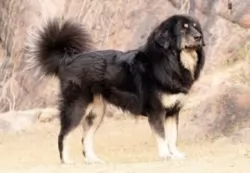 They are not always great with children, but they will protect own children in their family. Do not leave unattended.
They are not always great with children, but they will protect own children in their family. Do not leave unattended.
They have the ability to bring down a wolf or even a bear or snow leopard.
Because of his size, temperament and coat he is not very adaptable. He is good outside in a colder region and with a lot of land to roam, but not in a hot region or in an apartment.
This breed is very smart, learns quickly on his own.
 The Wirehaired Fox Terrier is good with children but if teased and frustrated he could bite. Children should know how to play with them and not to tease them.
The Wirehaired Fox Terrier is good with children but if teased and frustrated he could bite. Children should know how to play with them and not to tease them.
He is great at performing tricks, tracking, agility, watch dog, competitive hunting or field trials.
The Wirehaired Fox Terrier is quite adaptable and can live anywhere. He is not a big dog but remember he is very high energy.
The breed is very smart but being independent thinkers, they can be difficult to train at times. Consistency and patience are needed when training the Wirehaired Fox Terrier. They get bored easily and if training sessions are not fun you will lose them. This is a breed that loves people but need constant supervision and companionship.
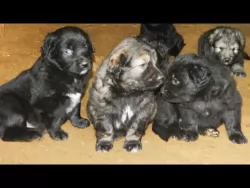 The breed is prone to obesity if they do not get enough exercise or a decent diet.
The breed is prone to obesity if they do not get enough exercise or a decent diet.
 This is basically a healthy breed, but there are some potential issues that could arise:
This is basically a healthy breed, but there are some potential issues that could arise:
This is possible in white terriers
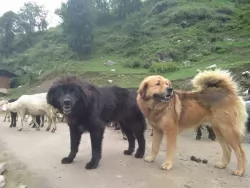 Should feed a high quality dry puppy food for large dogs. Give 1-2 cups per day split into 2-3 meals.
Should feed a high quality dry puppy food for large dogs. Give 1-2 cups per day split into 2-3 meals.
Again you want to feed high quality dry adult dog food for large dogs. Give 3-4 cups per day split into 2 meals. Watch for obesity and if your Gaddi Kutta is gaining too much weight, cut back.
The Gaddi Kutti seems to be immune to the most common of canine diseases.
This is a breed of very large dogs that need daily exercise by walking and running. However, since they have been fairly isolated in India and the Himalayas, he has not been exposed to organized dog play and exercise such as agility, dock jumping or field trials. He would probably succeed at all three.
 Give them two meals maybe three per day. Total food per day divided into the number of meals is 1/8-1/4 cup day.
Give them two meals maybe three per day. Total food per day divided into the number of meals is 1/8-1/4 cup day.
Once again feed one-two meals per day and don’t overfeed. Total of ½ cup day
Being a terrier, the Wirehaired Fox Terrier needs a lot of exercise. He is energetic and playful. He loves to play ball, take interesting walks, and play in fenced areas. He needs to be in either a fenced area or on a leash as he will chase any small animal that he sees moving. But if you leave him unsupervised in a fenced area, don’t forget he is a terrier. He is likely to dig under or climb over a fence that isn’t entirely secure.
He loves earth dog trials, agility, tracking, hunting, flyball, and running. He hardly ever walks. He can play ball chasing for hours if you let him. Exercise is bonding for you and your Wirehaired Fox Terrier.